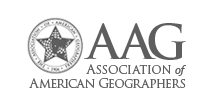EDGES is very proud to announce that Dr. Leila Harris, Cynthia Morinville and Andrea Marston will be presenting at the AAG Annual Meeting this week in New York. The AAG AM is an interdisciplinary forum that features a wide range of topics, including Political Geography, Natural Hazards, Climate Change, Social Justice and many more.
Dr. Harris will be presenting a paper, co-authored with Cecilia Roa, titled “Unnatural Neoliberalisms? Debating ‘Post-Neoliberalism’ and ‘Alternatives’ to Neoliberal Natures”. This talk critically investigates recent water governance shifts, particularly constitutional changes implemented in several countries that highlight a ‘right to water’ (e.g. South Africa) as well as more recent efforts that highlight such a right in conjunction with bans on private water provision (e.g. Uruguay, Ecuador, and Bolivia). Drawing on legal research, document review and interviews, the article investigates the historical, political and discursive scaffolding of these constitutional changes in each of these case study contexts, including attention to implementation issues and ongoing and challenges following the reforms. Drawing out connections across the case studies, the article also considers ways that these reforms intersect with resistance to neoliberal water governance shifts of the past several decades, including ‘anti-privatization’ and ‘human right to water’ debates and movements. As such, the article attends to both the specific historical-contextual formations that contribute to understanding the constitutional reforms and negotiations in each of these contexts, as well as the ways these changes might be usefully understood as connected to broader political and discursive shifts and movements. In drawing out the specificities of the case studies, as well as similarities and connections between them, the article makes conceptual contributions regarding variegation as central to the ongoing neoliberalization of nature, contributing to calls to clearly situate inherited institutional lineages and national policy landscapes as important to policy shifts and governance changes, yet also understanding ways that these changes are necessarily connected to multi-scalar political economic landscapes and movements.
The presentation is scheduled for Saturday, Feb 25th, at 10:00. For more information, please click HERE.
Cynthia Morinville’s presentation, “Virtual Pipes: Water Access in Informal Settlements of Accra, Ghana”, will take place on Monday, Feb 27th at 10:00.
Cynthia will be speaking about the challenges and peculiarities of water access in Accra. Despite important reforms to Ghana’s water sector in recent years, the capital city of Accra is afflicted by a daily 60,000-gallon supply deficit, while ‘unaccounted for’ water is estimated to be approximately 50%. Initiatives aiming at both alleviating water issues and engaging communities in the decision making processes in ways that are consistant with participatory resource governance are becoming frequent in rural settings but remain scarce and relatively new in Ghana’s urban areas. Drawing on 45 interviews conducted in Accra during the summer of 2011, this article explores the ways in which underserved community members negotiate access to water, as well as the drivers and limitations to community involvement in water management and decision making. The analysis concludes that community members rely on a myriad of strategies to secure access to water and argues that in order to fully understand their involvement and participation we must turn away from traditional conceptions of resource distribution linked to a material understanding of ‘the grid’; and instead consider those alternatives and the creation of a ‘virtual grid’.
For more information, please click HERE.
Andrea Marston will be presenting “Not-Quite-Neoliberal? Contesting Neoliberal Natures in Latin America” on Saturday, Feb 25th, at 14:40.
Andrea will be speaking to issues of water governance in peri-urban Cochabamba, Bolivia, where proponents of community-based water governance often envision it as a third, ontologically distinct alternative to the public versus private water debate. In analyzing the history and current manifestation of community water governance in peri-urban Cochabamba, Bolivia, this paper presents a critique of the idea that a community can maintain ideological and operational autonomy when governing a flow resource. More than a decade after residents of Cochabamba successfully resisted the privatization of their urban water supply during the celebrated “Water Wars,” the reinstalled public utility still fails to provide water or sanitation services to most of the city’s rapidly growing peri-urban areas. Here, hundreds of water committees continue a long tradition of drilling wells and governing distribution networks. Despite their autonomous rhetoric, however, these water committees are not operating in isolation: a host of public, private, academic, and non-profit actors has flourished alongside them, and the emerging water supply systems are supported by a diverse alliance of interests. While acknowledging the capacity of these institutional assemblages to adapt to the specific water needs of peri-urban residents, the paper closes by questioning their scalability and suitability for water governance at the regional level.
For more information, please click HERE.

